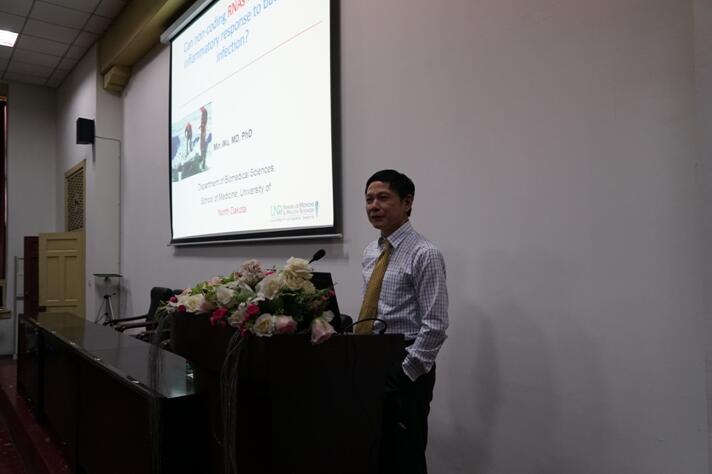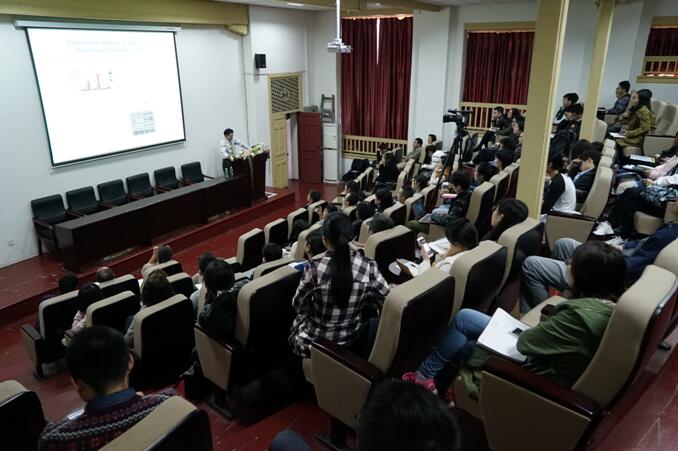Min Wu, Professor of North Dakota State University, gave an academic seminar in Lecture Hall of the 5thteaching building during the afternoon of November 11, 2017. Our department heads, teachers and students of our college attended the lecture, the report was chaired by Prof. Changlong Li, the party chief of secretary of our college.

Prof. Wu on the Lecture
Professor Wu enjoyably recalled the academic cooperation with our Dean, Professor Canhua Huang, and showed great interest in future collaboration. Afterwards, Professor Wu made an academic lecture titled‘Could Non-coding RNA be Used as Anti-inflammatory Strategy in Infection’, which was fun, and vividly illuminated the function and application prospect of non-coding RNA in inflammatory response.

Lecture Scene
In the first part of the lecture, Professor Wu reported the process of finding IncRNA MET3-4 and its functional study. Their team found MET3-4 can adsorptively bond micro non-coding RNA- miR-138 and then suppress the function of miR-138. As all known, miR-138 can suppress the expression of downstream gene IL-1β.AfterPseudomonas aeruginosa infection, the expression of MET3-4 declined obviously in lung, so the inhibition to miR-138 weakened, and intracellular free miR-138 increased. Furthermore, miR-138 inhibited the expression of IL-1β, and ultimately resulted inweakened inflammatory response, which was beneficial to bacterial invasion.
In the second part, Professor Wu shared their newest discovery that CRISPR-Cas System regulated bacteria gene expression and enhanced pathogenicity. Professor Wu’s lab found in Pseudomonas aeruginosa type I CRISPR-Cas System can degrade bacterial LasR RNA. After reducing the expression of LasR gene, the recognition ability of host cell TLR4 was weakened, so bacteria can avoid host immune cell phagocytosis, which strengthened bacteria toxicity. These outcome can provide new target for new therapy.
At the end of the lecture, Professor Wu discussed hot topics with our teachers and students, which fully showed our good academic quality and strong academic atmosphere.
CV of Professor Min Wu:
Min Wu, Ph.D.
Education
• MD (MBBS) 1983 Luzhou Medical School, China
• M.S., Immunology 1988 Shanghai Jiao Tong University, China
• Ph.D., Genetic & Biochemistry 1997 University of Leeds, United Kingdom
Professional Experience
• Research Associate, Indiana University
• Research Officer, Dept. of Biology, Leeds University, UK
Keywords: Gram-negative bacterial infection, Pseudomonas aerugionsa, Klebsiella pneumoniae, immunity, lung injury, airway remodeling, asthma, inflammation, macrophage phagocytosis, lung development, stem cells, base excision DNA repair, nanotechnology and nanoparticles.
Scientific Journal Editorial Board Membership
• Infection and Immunity (from 2012)
• Nanomedicine NBM (Special Associate Editor, Elsevier, 2011)
• PLoS ONE (Academic Editor)
• Am J Respir Mol Cell Biol (from 2010, American Thoracic Society)
• Open Access Immunology - Publishing London (Editor-in-Chief, since 2013)
Research Interest
The Wu lab investigates molecular mechanisms of P. aeruginosa (PA) respiratory infection and molecular and cellular mechanisms of airway inflammation (asthma and chronic obstructive pulmonary disease, COPD). The lab focuses on fundamental mechanisms of biological processes: stem cell/progenitor differentiation, tissue repair, immunity, and homeostasis. Approaches include siRNA, advanced microscopy, small rodent imaging, chromatin immunoprecipitation, and tagged proteins as well as cell culture, transgenic mice, knockout mice, and clinical samples.
The lab studies macrophages phagocytosis, particularly the phagosome maturation linked to Lyn, Akt, SHIP1, and lipid rafts for bacterial clearance. The long-term goal is to develop novel therapeutic strategies (herbs and gene delivery) and vaccines (e.g., attenuated bacterial strains). Another area of focus is to understand the role of base excision DNA repair (BER, OGG1) in lung injury: whether environmental toxins (heavy metals or cigarette smoking) induced genetic and epigenetic modifications and the underlying regulators (miRNAs) are associated with pathogenesis of lung degenerative diseases. The lab also analyzes novel silica nano-material cytotoxicity and applies new nanoparticles in diagnostics, imaging, and therapeutic delivery.
https://med.und.edu/biomedical-sciences/archive/faculty-staff/min-wu.cfm